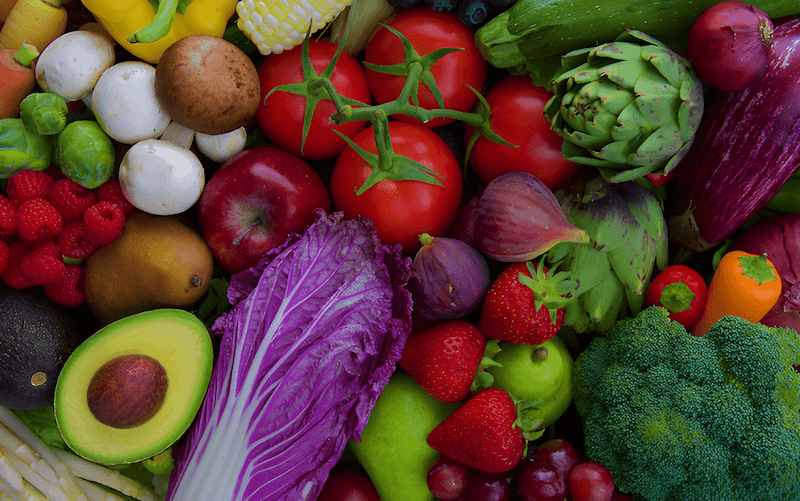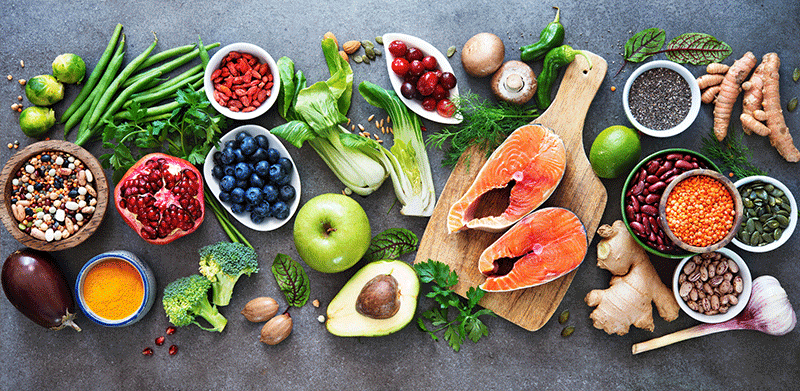
When you think about your diet, you might consider the taste, cost, and convenience of the foods you consume. But have you ever considered the nutrient density of your meals? Probably not!
By the time fruits and vegetables reach the supermarket, they have lost 90% of their nutritional value and the remaining 10% virtually disappears after cooking them at home for a meal.
Studies have found that most middle-class families are malnourished due to the lack of vitamins, minerals and digestive enzymes in their fruits and vegetables.
All of this changes however with the consumption of nutrient dense foods that are packed with body absorbable vitamins, minerals, and other beneficial compounds like gut friendly digestive enzymes. They are the true superstars of the fresh produce world, providing the most health benefits per bite.
Incorporating nutrient-dense foods into your daily diet sets you on a path to wellness that is simply unachievable by any other means.
Unfortunately, nutrient-dense foods like free range meat and eggs, wild caught fish, whole grains, blueberries, kale, spinach, tomatoes, potatoes and beans are often overlooked in favor of more processed, zero nutrition options like the chips I am eating as I write this article.
But with a little knowledge and discipline, you can start prioritizing these power-packed foods in your diet. This comprehensive guide will provide you with the tools you need to make nutrient-dense foods a staple of your daily diet.

The first thing to consider before you get started is change the way you look at food and what you may consider good for you or at the very least not harmful.
Most snacks or “convenience foods” as they are commonly referred to contain a host of artificial ingredients many of which are barely pronounceable. Snacks contain virtually zero nutrient and as such are deemed as “empty” foods.
To make matters worse, many of these artificial ingredients are stored in the body, some until the day you die. Food biologists claim that the bodies of people over 50 have over a pound of plastic in them.
Interestingly, the slogan “There’s A Little Bit Of It In Everyone” introduced by McDonalds in the eighties was quickly cancelled just weeks after it began. They knew, and the people were catching on!
Getting started on the path to wellness is to begin with seeing the difference between food and snacks. Snacks can be identified as anything that is processed – comes in a box, carton or bag. Food is identified as an unaltered, natural living plant, animal or animal byproduct.
You want to eat more of the good stuff than the bad, so all you have to do is identify what you eat more of recognize that as a staple. If you staple is the snack, then you are on the wrong path. If you change your staple to food then you are heading in the right direction.
You will find as you switch from snack to food as staple in your diet, you will eliminate any cravings for convenience foods in just a couple of months. You skin will look better, your eyesight will improve, you will have more energy, have a clear mind and you will lose weight. Certainly, food for thought!
Nutrition begins with elements that can be readily broken down, absorbed and used by the body. These elements must be water soluble, which is why living plant and animal-based foods are most beneficial to the body for maintenance and optimal health.
Elements that are essential to our bodies are various minerals, vitamins and enzymes. Vitamin D for example, is important for heart health and immune system support while the mineral magnesium maintains digestion and provides relief from constipation.
A host of minerals and vitamins and are present in nutrient dense food including Vitamins A, B, C, D, E, and K as well as Calcium, Phosphorus, Magnesium, Sodium, Potassium. Chloride, and Sulfur.
Often forgotten but not to be overlooked, several trace minerals present in nutrient dense food are important for optimal health as well. These include Iron, a blood building mineral, Zinc, the hair, skin and nails mineral, Copper for healthy nerves, Manganese for the brain, Iodine to regulate metabolism, and Selenium, which regulates sleep.
Whole foods should be at the top of your list in a nutrient dense food diet. Whole foods are foods that have been processed or refined as little as possible and are free from additives or other artificial substances. Examples include organic fruits, vegetables, whole grains, nuts, seeds, and legumes.
Whole foods are typically high in fiber, which is sufficient quantiles supports digestive health and helps control weight by keeping you regular. They also contain a plethora of essential vitamins and minerals, making them a great choice to include in a nutrient dense diet.
In addition, whole foods are often rich in antioxidants, compounds that protect your body against damage from harmful molecules know as free radicals.
Including more whole foods in your diet can lead to numerous health benefits. These foods can help lower your risk of chronic diseases, improve digestion, support weight loss, and enhance your overall health and wellness.
The impact of nutrient-dense foods on health and wellness can be profound.
First and foremost, the consumption of nutrient-dense foods offers the essential nourishment your body requires for peak performance. This includes key nutrients that bolster the immune system, enhance skin health, assist in digestion, and fuel energy production, among other functions. Providing your body with these necessary nutrients lays the groundwork for your path to wellness.
Next, these nourishing foods play a vital role in weight management. Generally low in calories but rich in fiber and protein, they help you feel satisfied for extended periods, decreasing the chances of eating too much. Moreover, they aid in stabilizing blood sugar, minimizing those snack cravings.
Finally, adopting a diet abundant in nutrient-dense foods is a pre-emptive strategy to stave off chronic illnesses, like heart disease and cancer. A substantial number of these foods contain antioxidants, which have the potential to reduce or eliminate inflammation, a principal factor in the development of heart disease, diabetes, and cancer.
By choosing food over snacks, you're actively taking measures to safeguard your health.
In recent years, there's been a growing interest in organic foods and superfoods for their potential health benefits. Organic foods are grown without the use of synthetic pesticides and fertilizers, while superfoods are foods that are nutritionally dense compared to some others and thus are better for a person’s health.
Both organic foods and superfoods can play a role in a nutrient-dense diet. Organic foods can be a healthier choice if you are concerned about pesticide exposure, while superfoods, like berries, leafy greens, and nuts, are packed with nutrients to give your body a boost and supercharge the immune system.
However, it's crucial to remember that the most important factor in your diet is not whether a food is organic or a superfood, but rather its overall nutritional value within your diet. A balanced diet featuring a variety of nutrient-dense foods will provide the most health benefits.

Food security is a major issue worldwide, with millions of people lacking access to sufficient, safe, and nutritious food. One way to combat this issue is through the promotion of nutrient-dense foods.
Nutrient-dense foods, particularly those that are locally sourced and sustainably grown, can play a crucial role in achieving food security. They can provide communities with access to highly nutritious foods while also supporting local economies and sustainable agriculture.
An acre devoted to cultivating nutrient-dense foods can yield the same number of vitamins and minerals that a 10-acre farm might produce with lower-density fruits and vegetables. This efficiency in land usage can be a significant step towards resolving the problem of hidden hunger, a type of undernutrition where individuals might be consuming adequate quantities of food but are still deficient in essential nutrients.
Sustainable agriculture is a farming system that's environmentally friendly, socially responsible, and economically viable. It involves practices that protect the environment, support local farmers, and provide nutrient packed fruits and vegetables.
Combined with innovative resource-smart technologies provided by Crop Circle Farms, sustainable agriculture can contribute significantly to nutrient-dense food systems. By prioritizing soil health, adopting no-till agriculture methods, promoting biodiversity, and low water and fertilizer use, we can produce foods that are not only healthier for all of us but also better our planet.
Including agricultural soil building activities, such as crop rotation, organic farming, and targeted agriculture methods, can increase the nutritional value of crops in a sustainable way. By supporting sustainable agriculture, we're investing in a food system that can provide us with nutrient-dense produce anywhere we grow.
Dietary guidelines set out by health provisional and government officials play a crucial role in shaping our food choices and recommended diet. By adapting these guidelines to include more nutrient-dense foods, the correct recommendations can promote healthier eating habits and improve public health.
Many dietary guidelines already recommend consuming a variety of nutrient-dense foods. However, there's room for improvement. For example, guidelines could provide more specific recommendations for the types and amounts of nutrient-dense foods people should be eating.
Clearly, dietary guidelines would place greater emphasis on the importance of consuming whole foods and the avoidance of processed foods for better health and by doing so, they can encourage individuals to choose foods that are better for them and avoid connivence foods with added sugars, unhealthy fats, and sodium.
While nutrient-dense foods should form the basis of your diet, nutritional supplements can play a role in certain situations. For example, if you have a nutrient deficiency, are pregnant, or follow a restrictive diet, supplements can help ensure you're getting the nutrients you need.
However, supplements should not replace a healthy, balanced diet. It's always best to get your nutrients from whole foods whenever possible, as they provide a broad range of nutrients that work together to support your health.
It’s important to remember that not all supplements are created equal, so do your research and compare ingredients on the product labels.

Teaching young people, the benefits of healthy food consumption early in their formative years could create a profound shift in their diet. Studies have shown that a poor diet in or out of school during these formative years affects a child’s ability to learn.
Nutritional education can take many forms, from school-based programs to community workshops to online resources. Regardless of the format, the goal is the same: to provide young people with the knowledge and skills they need to eat “real” food.
Investing in nutritional education is also an investment in public health. By promoting nutrient-dense foods, we can help prevent chronic diseases, improve health outcomes, and enhance the quality of life for school age children and their families.
Now that you understand the benefits of nutrient-dense foods, you might be wondering how to incorporate them into your diet. Here are some practical tips:
Incorporating these nutrient-dense foods into your diet provides your body with the nutrients it needs to attain top health, manage your weight, increase your energy, clear your mine, improve your eyesight, and guard against the development of chronic diseases.
Remember, eating a nutrient-dense diet doesn't have to be complicated or restrictive. It's about making healthier choices and finding ways to include more nutritious foods in your meals.
With knowledge, planning, discipline and a little creativity, you can transform your diet and set yourself on a pathway to wellness with the help of nutrient-dense foods. Start today for a better tomorrow one meal at a time.